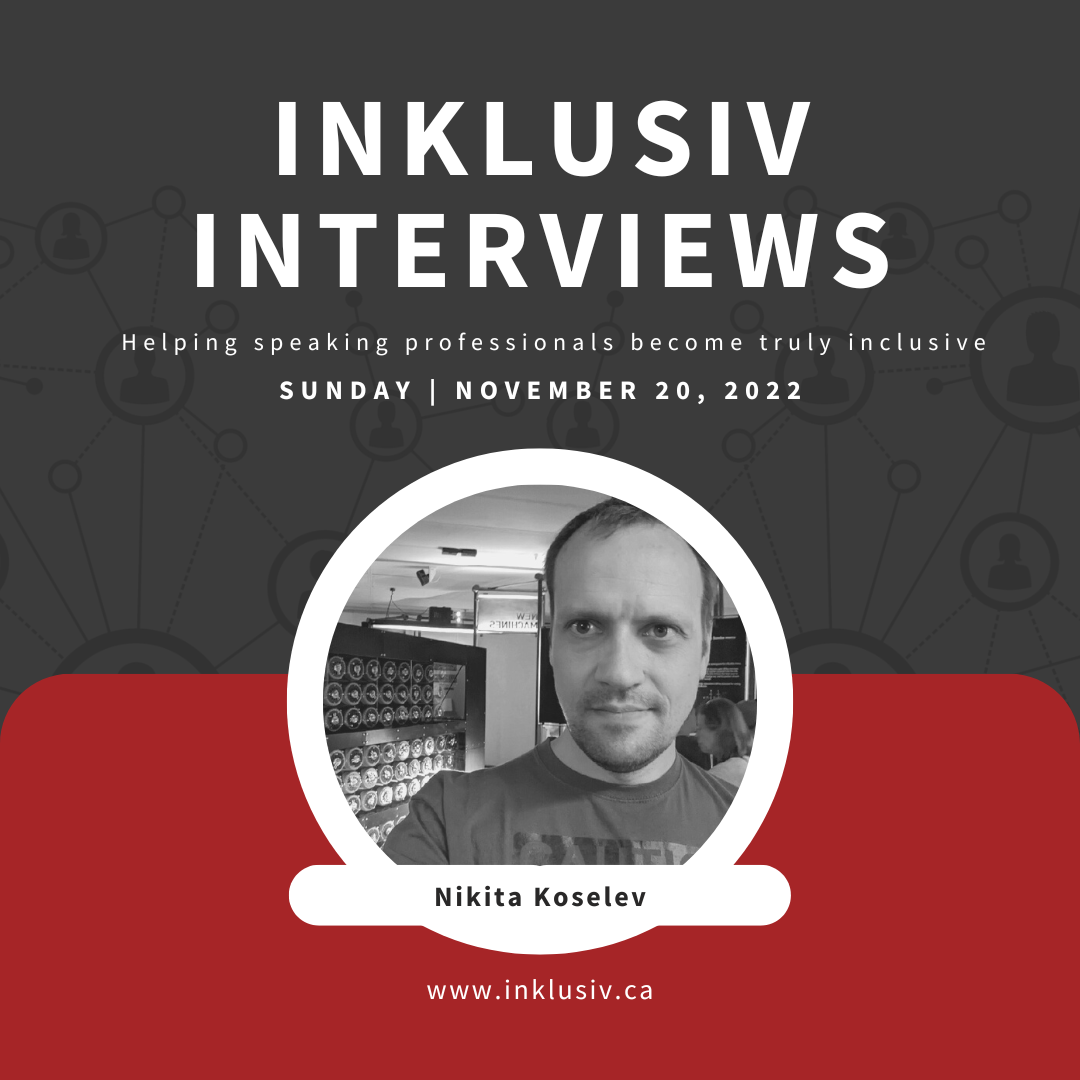Interview with Nikita Koselev

Every week, we meet with audience members with disabilities who are willing to come forward and share a little bit about their own personal journey and experiences, attending live, in-person, or virtual speaking or training events. Through their unique and generous perspectives, speakers, trainers, facilitators, and other communication professionals can hopefully learn about some of the things that they do well, but also (and maybe more importantly) about some of the things they could improve to provide an experience that is truly inclusive of everyone.
Meet Nikita, an audience member who has autism
So, without further ado, let’s dive right into this week’s interview with Nikita Koselev (he/him). Nikita has autism and comes to us from England, United Kingdom.
Introductions
QUESTION 01 Can you tell us a bit about yourself, and how your disability might impact your experience, as someone who attends live in-person and virtual events?
My name is Nikita and my special ability is autism. My ability makes it hard to listen to a conversation I am not interested in. My brain switches off literally in 3 seconds, or finds a much more interesting topic to think about. Also, I tend to leave the “after parties” as often music is loud there and there is not much space, so if I am not involved in a really interesting discussion, I would rather leave asap.
Things that ruin the experience
QUESTION 02 Thinking back on some of your experiences attending in-person or virtual events, what are some of the worst things speakers, trainers, and other communication experts can do to ruin your experience as an attendee?
Well, I had quite an interesting life, so it’s hard to make me hurt. Probably the only way to make me hurt is by hurting somebody else. I think I was lucky and most of the talks I have attended were great and inclusive.
However, there is one thing. It is *very* hard for me to remember people’s names. I would really ask to always show the speaker’s name and social media handle overlay on the screen. This is especially true for a live stream and for multiple speakers.
Things that make a positive impact
QUESTION 03 Can you share some of the great things speakers, trainers, and other communication experts sometimes do that make a positive impact on your ability to fully enjoy your in-person or virtual event experiences?
Inclusive speakers talk about solutions, not problems as such. They do not bring politics/religion or other divisive things to the talks. They speak slowly and focus on quality, not quantity. They include QR code with their profile in their presentation, on their “about me” page.
Sharing a piece of advice
QUESTION 04 If you had one piece of advice to give speakers, trainers, and other communication experts, so their content became more inclusive of people who have disabilities, what would it be?
Make sure the session is recorded, with a high-quality sound.
Wrapping up
QUESTION 05 Thank you for sharing some of your insights with us today. As we wrap up our conversation, is there anything that you’d like to add, such as another thought, another piece of advice, another perspective, etc.?
I’ve heard that only 20% of autistic people are employed. I am not asking for “free stuff”. Instead, I am suggesting supporting people with special abilities, who learn openly and share with others. These people are important role models, and they show others that these days it is possible to be employed and happy, even if you have special abilities.
Connect with our guest on social
Interested in knowing more about our guest this week? You can follow Nikita on LinkedIn and Twitter.

About Denis Boudreau
Denis Boudreau is a consultant, trainer, and speaker specializing in digital accessibility and disability inclusion. He works with organizational leaders who want to equip their teams with the skills to create accessible websites and digital products – so no one is left behind. A Certified Professional in Web Accessibility (CPWA), Denis has trained thousands of web professionals over the past 20+ years and delivered hundreds of workshops in both English and French. He has helped leading brands like Netflix, Salesforce, and Victoria’s Secret embed accessibility into their digital strategies, empowering them to meet legal obligations, improve user experience, and connect with more people, more effectively.
